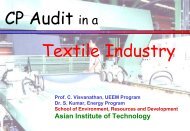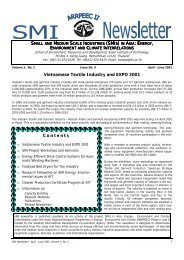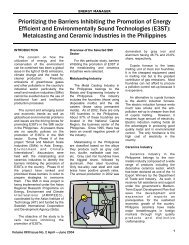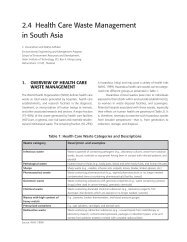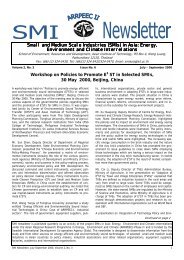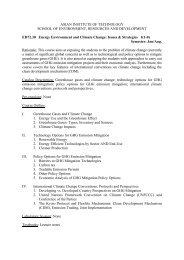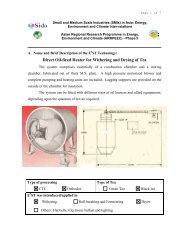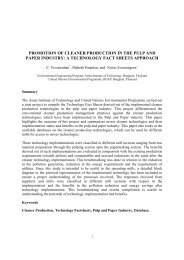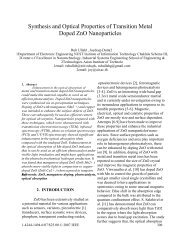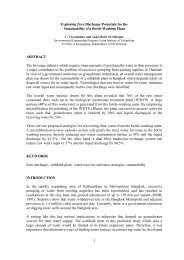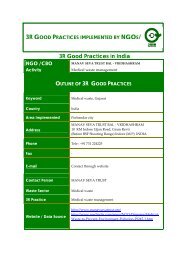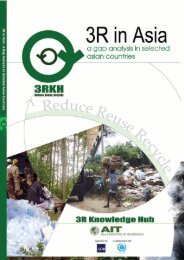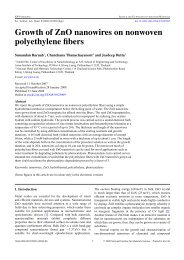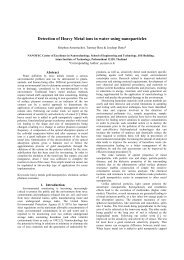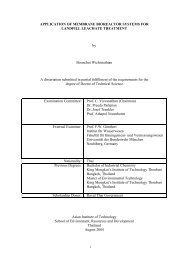Evaluation of Plastic Waste Management in Thailand Using Material ...
Evaluation of Plastic Waste Management in Thailand Using Material ...
Evaluation of Plastic Waste Management in Thailand Using Material ...
You also want an ePaper? Increase the reach of your titles
YUMPU automatically turns print PDFs into web optimized ePapers that Google loves.
estates. People though that the oil recovery from plastic wastes is better than plastic waste<br />
<strong>in</strong>c<strong>in</strong>eration because <strong>of</strong> the high consumption rate <strong>of</strong> fossil fuels. In waste shop’s view, the<br />
waste <strong>in</strong>c<strong>in</strong>eration is good to dispose plastic wastes because the residue wastes from<br />
sort<strong>in</strong>g can be sold to cement <strong>in</strong>dustry. Accord<strong>in</strong>g to waste shop respondents, the waste to<br />
energy project is difficulty <strong>in</strong> giv<strong>in</strong>g cont<strong>in</strong>uity because the waste to energy scheme does<br />
not promote cont<strong>in</strong>uously. The weaknesses <strong>of</strong> energy recovery from plastic wastes are<br />
lacks <strong>of</strong> <strong>in</strong>formation shar<strong>in</strong>g and project monitor<strong>in</strong>g. Therefore, people do not know on oil<br />
recovery from plastic wastes or waste <strong>in</strong>c<strong>in</strong>eration. Some people do not understand the<br />
mean<strong>in</strong>g <strong>of</strong> waste to energy, and they cannot imag<strong>in</strong>e on the energy recovery from oil<br />
recovery plants and waste <strong>in</strong>c<strong>in</strong>erators.<br />
Bann<strong>in</strong>g plastic bag used <strong>in</strong> <strong>Thailand</strong>, this scheme relates to the scenario 2 <strong>in</strong> order to<br />
reduce the plastic bag wastes <strong>in</strong> municipal wastes. Approximately 46% <strong>of</strong> 125 samples<br />
agreed with the plastic bag bann<strong>in</strong>g. Some department stores <strong>in</strong> Bangkok like The Mall and<br />
Central stimulated their customers to ban plastic bags. For <strong>in</strong>stance, The Mall reduces one<br />
Baht per bill for customers who refused plastic bags (Thairath, 2013). The Central<br />
department store promoted “Central No Bag Day Sale”, and it gave 5% discount for<br />
participated customers (THANONLINE, 2013).<br />
Only 13% <strong>of</strong> 125 samples agreed with the plastic bag charge followed by the plastic bag<br />
taxation. In 2009, the public op<strong>in</strong>ion survey on the plastic bag taxation was done, and the<br />
result was that Thai consumers opposed the plastic bag taxation (Boonyaraks, 2009).<br />
Therefore, Thai people still oppose with the plastic bag taxation. This scheme <strong>in</strong> the<br />
scenario 2 may be less success than the recycl<strong>in</strong>g bus<strong>in</strong>ess scheme. It is not only<br />
consumers who opposed the plastic bag taxation, but it is also the plastic bag producers<br />
who lose their pr<strong>of</strong>its from this taxation.<br />
F<strong>in</strong>ally, the waste collection and transportation <strong>of</strong> the scenario 2 and 3 will be improved to<br />
collect over 90% <strong>of</strong> plastic waste generation <strong>in</strong> 2016. The waste collection fee is the<br />
important factor to support the waste collection service, but the municipalities, <strong>in</strong> fact, ga<strong>in</strong><br />
a little revenue from waste generators. The waste collection fee is the one proposed scheme<br />
<strong>of</strong> scenario 2 and 3. Only 15% <strong>of</strong> 125 samples agreed with the waste collection fee. People<br />
did not satisfy with the exist<strong>in</strong>g waste collection services, so they do not want to pay more<br />
for the poor waste collection services. Hence, the government has to focus on this issue<br />
because the budgets/funds are important to improve plastic waste management facilities<br />
and projects.<br />
4.4 Stakeholder Analysis for <strong>Plastic</strong> <strong>Waste</strong> <strong>Management</strong> <strong>in</strong> <strong>Thailand</strong><br />
The primary data and secondary data were analyzed to present the relevant and important<br />
stakeholders <strong>of</strong> plastic waste management <strong>in</strong> <strong>Thailand</strong>. This section consists <strong>of</strong> the lists <strong>of</strong><br />
important stakeholders, their roles and responsibilities and the relationship and networks<br />
among each other. Stakeholder analysis is very critical <strong>in</strong> terms <strong>of</strong> assess<strong>in</strong>g the practices<br />
<strong>of</strong> plastic waste management at current sett<strong>in</strong>g as well as <strong>in</strong> terms <strong>of</strong> plann<strong>in</strong>g futuristic<br />
direction <strong>of</strong> the plastic waste management As a general rule <strong>of</strong> thumb, each stakeholders<br />
when follow their roles and responsibilities aids the success <strong>of</strong> a project, better plastic<br />
waste management <strong>in</strong> this context.<br />
87



